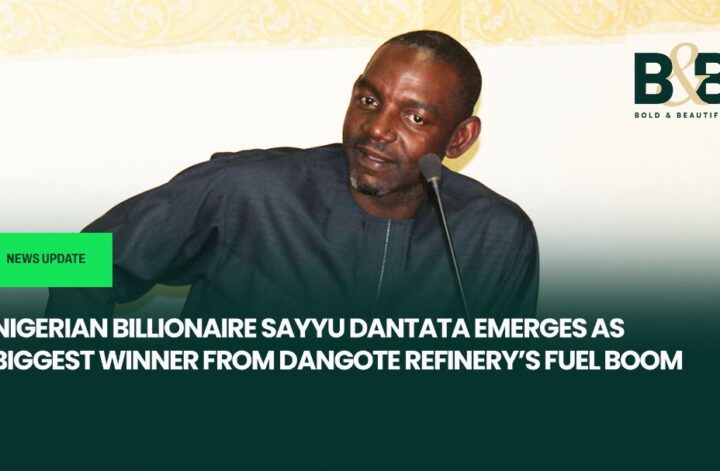The ripple effects of Aliko Dangote’s massive refinery project are beginning to reshape Nigeria’s energy and business landscape, and at the heart of this shift is Sayyu Dantata, the billionaire founder of MRS Holdings. Positioned as one of the most strategic beneficiaries of the refinery’s fuel boom, Dantata has quietly but decisively strengthened his role in Nigeria’s downstream sector.

For decades, Nigeria’s dependence on imported refined petroleum products drained billions from the economy and left businesses vulnerable to international price shocks. The commissioning of the Dangote Refinery has changed the dynamics almost overnight, redirecting supply chains and creating new centres of wealth within the domestic economy. Sayyu Dantata, already an established figure in oil trading, logistics, and distribution, has emerged as one of the clearest winners.
MRS Holdings, his flagship conglomerate, has long been a dominant player in fuel importation, storage, and distribution across West Africa. With the Dangote Refinery producing at scale, the reliance on imports is rapidly shrinking. This has boosted companies with existing infrastructure for storage and retail, and MRS sits at the front of the line.

Industry sources suggest that Dantata’s early moves to align with Dangote’s refinery vision have paid off handsomely. MRS has leveraged its expansive network of depots and filling stations to capture a greater share of the domestic market, distributing newly refined products directly from the Lagos-based refinery. For an entrepreneur who has spent years navigating Nigeria’s notoriously difficult oil and gas sector, this moment marks the fulfilment of careful positioning.
Sayyu Dantata is not new to big wins in the oil economy. A cousin of Aliko Dangote, he cut his teeth in business with a focus on trading before building MRS Holdings into one of Africa’s most formidable downstream energy groups. His ability to anticipate shifts in the industry has distinguished him as more than just a relative of Africa’s richest man. With the fuel boom sparked by the refinery, he has become a central figure in the reconfiguration of Nigeria’s petroleum supply.
The benefits extend beyond his personal fortune. By capturing a larger share of the distribution chain, MRS Holdings has increased fuel availability at competitive prices in key Nigerian cities. This stabilisation has been welcomed by transporters, manufacturers, and small businesses that depend on predictable energy supply. Dantata’s gain is therefore not only financial but also tied to broader economic relief for millions of Nigerians.

Observers note that the fuel boom has set off a scramble among downstream operators to adjust their business models. Many who relied on importation are now recalibrating, while those with strong domestic distribution capacity, like Dantata, are thriving. The billionaire’s foresight in building robust infrastructure before the refinery came online is proving decisive.
His success also highlights the growing dominance of Nigerian entrepreneurs in sectors once heavily dependent on foreign participation. For years, multinational oil traders controlled the downstream flow into Nigeria. The rise of players like Dantata signals a new era where indigenous companies not only survive but prosper in a liberalised environment.
The Dangote Refinery’s impact is still in its early stages, but already fortunes are shifting, and Sayyu Dantata’s name features prominently in the new order. His story is one of preparation meeting opportunity, of a businessman who understood that the biggest refinery in Africa would not just transform the macroeconomic numbers but would also create room for new domestic champions.
For Nigeria, the emergence of Dantata as a major winner symbolises the local wealth creation that many had hoped the refinery would trigger. For the billionaire himself, it marks another milestone in a career defined by strategic bets on the future of energy in Africa.





